
I’m a fan of Star Trek. I’m not obsessive with the minutiae of it all (not as much as some other pop culture staples…**ahemJamesBondahem**), but I appreciate it greatly, both as a cultural touchstone and influence, and as an enduring storytelling series.
That being said, I absolutely loathed.. LOATHED.. the previous film, the 2013 Star Trek-mixtape known as Star Trek Into Reference. After that, there wasn’t too much getting me excited over Star Trek Beyond. The seemingly never-ending behind-the-scenes drama, the departure of two directors, the tight turnaround, and a lackluster first teaser did little to assuage those concerns. It felt more like I was planning on watching it out of obligation. But I am glad I did see it, especially in a movie theater in this, Star Trek’s 50th anniversary. Not only is this film wildly entertaining, it does a much needed course correction in the wake of the dour, convoluted, vapid, misanthropic Into Darkness.
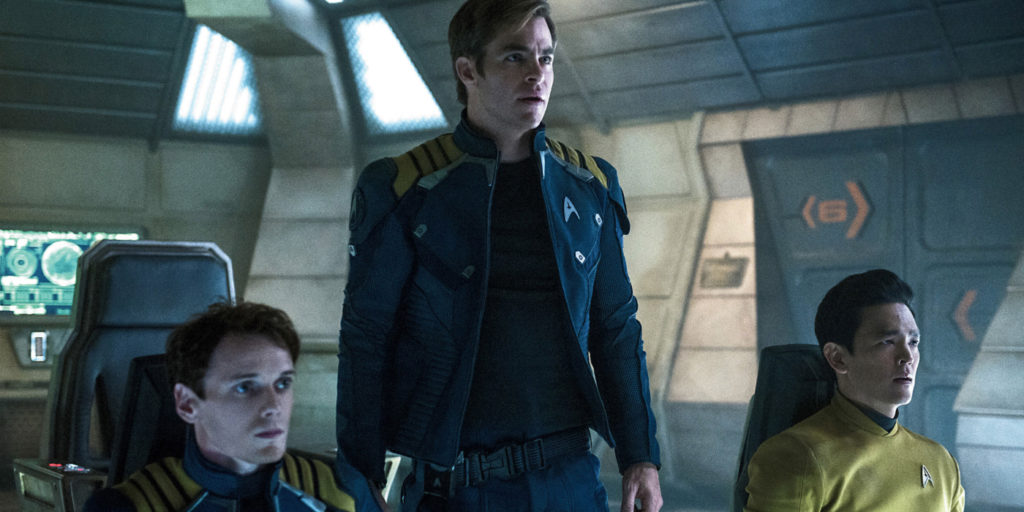
The film starts off with Kirk (Chris Pine) ruminating on life in deep space: after a botched peace-brokering mission, Kirk reflects on the routine of deep-space life. Routine, it seems, is boring, even if it is in deep space; and with his birthday coming up, he realizes that he is adrift. He joined Starfleet on a dare, to try to live up to his father’s legacy, and now here he was, having lived longer than his father ever did. While docked for resupply at the massive Yorktown deep space station, Kirk is offered an admiralty position, which would ground him.
Spock, on the other hand, is contemplating his own goals. Having been informed that Spock Prime has died, the fate of his own species is come into question, and Spock weighs staying in Starfleet against settling down and having a bunch of kids (Vulcan was destroyed, so there is cause for concern). Before either can settle down for some much needed decision-making, Kalara, an alien traveler, makes contact with Yorktown, requesting help to rescue her crew on the planet Altamid, which is located beyond a dense asteroid field.
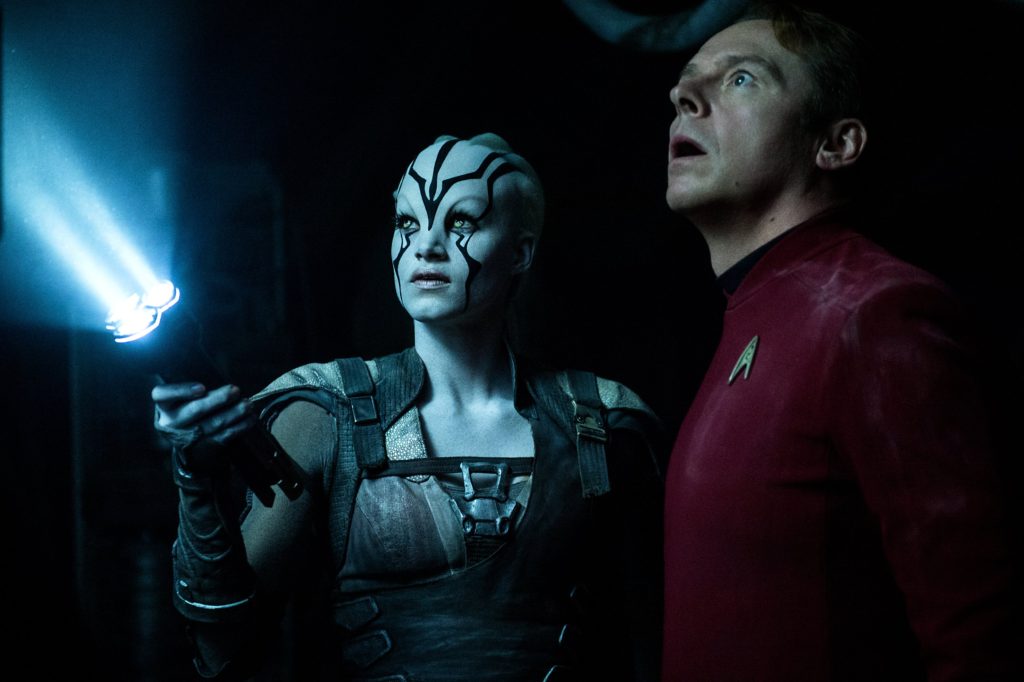
It’s a trap!…wait, wrong franchise. Before the Enterprise can even register what is happening, a massive swarm of alien vessels attack the ship, destroying its major instruments, before boarding parties…led by Idris Elba’s alien commander, Krall…literally rip the ship apart (it’s a stunning sequence of scenes, and quite melancholic as well. The Enterprise gets destroyed several times in the film).
The crew abandons ship, escaping to the planet below–with a majority swept away and taken prisoner–and are separated for most of the runtime. They must regroup, find a way off the planet, and uncover what Krall’s animosity towards the Federation is all about (and, summarily, how to stop it). And all this in just the first 30 or 40-minutes.
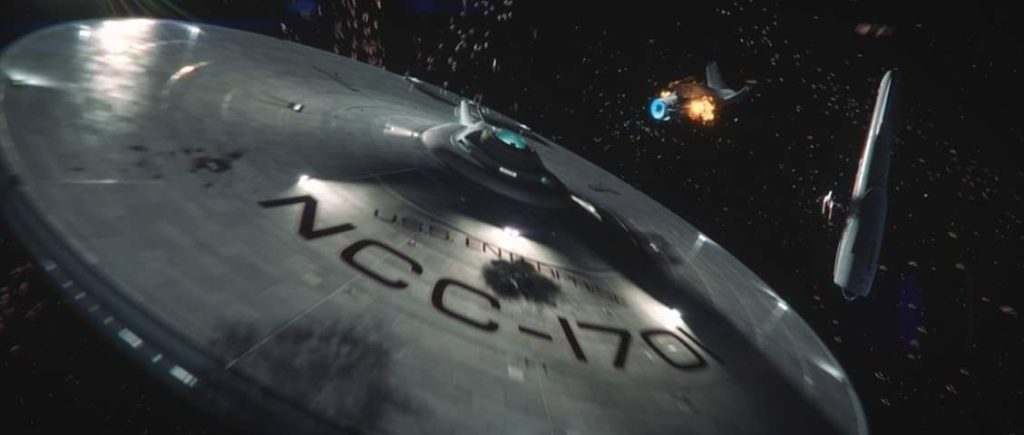
There are many great aspects to this film, the biggest being the cast dynamic. Director Justin Lin was the oddest possible choice for this very, very geeky franchise, but it ultimately makes sense. He’s the director responsible for the last few Fast and Furious movies, which–while increasingly outlandish–has a strong central ensemble cast with great chemistry, and who feel like real people (in between stunts, of course). He came onto a franchise created by others, and turned it around; and did so with a very tight release date, much like this film. He has the action chops down pat, not only with pacing, but with composition as well, which makes the action flow better, which makes for a generally more enjoyable film. And finally, he’s someone who actually understands the basic themes of Star Trek, as the following quote illustrates:
“As great as JJ’s films were, there’s still a lot to be mined from these characters. They haven’t really gone on their five-year mission, so what we experienced in the TV show hasn’t been touched on yet. That sets up an opportunity for exploration and the deeper you go, the more you are examining humanity. Those are the things that I absorbed as a kid and hope to tap into and embrace and celebrate.”

Finally, the rebooted Star Trek universe has a sense of identity, one at once familiar yet new. And it starts with the characters. Pine didn’t work entirely well with me initially as Kirk. In 2009’s film, he seemed a (very charming, likable) caricature of Kirk, and in Into Darkness he was…whatever the individual scene needed him to be? Here he feels like an actual leader, especially his scenes with the late Anton Yelchin as Chekov, and he’s actually smart, using double and triple crosses, strategic thinking, and even the wreckage of his own ship to escape danger, as opposed to his usual reaction of “blow something up”.
Spock (Zachary Quinto) and Bones (the ever-dependable Karl Urban) fare much better than they have previously; stranding them together was a brilliant decision that allowed us to actually see that they care for, and respect, each other, despite their constant bickering. And Scotty (co-writer Simon Pegg) encounters Jaylah (Sofia Boutella), an alien scavenger who knows way too much about the Federation for it to be conicidence.
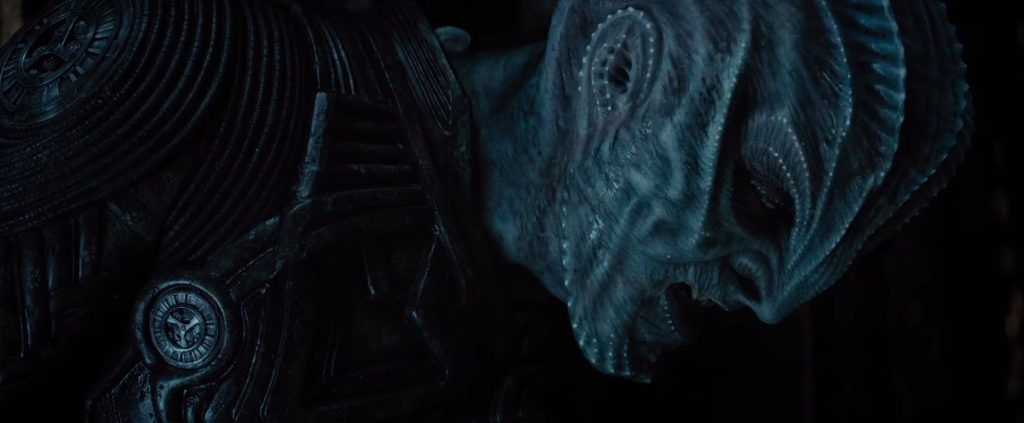
But it’s Elba as the villain, Krall, who is the most interesting character in this rebooted universe, and who comes oh-so-close to being an absolute classic villain. His motivation becomes very clear towards the end (about the time the crew encounter a long-lost experimental Federation vessel, the Franklin), and his ultimate goal has a counterpart with today’s political themes. Kirk’s philosophy–he actually has one now, finally!–is that strength comes from unity and diversity; that together, people overcome obstacles by incorporating differences. Krall, a hardline warrior, believes strength comes from conflict and battle; he believes the Federation is soft and weak, and in an attempt to strengthen the human race, he threatens to destroy it. While Krall’s is an extreme, we hear echoes of that from some of today’s (potential) leaders.
And this is why this film works: it’s topical, the way Star Trek has always been, as well as full of adventure (not necessarily action — there is a difference). And it’s full of hope. Whereas Into Darkness skirted with the idea of the Federation being a secret military organization, Beyond shows that it’s the culmination of diversity, and of overcoming obstacles, and facing problems with brains before brawn. If anything, this feels like a lost Season 2 episode of the original series, one that has the proper mix of action, camp, and metaphor.
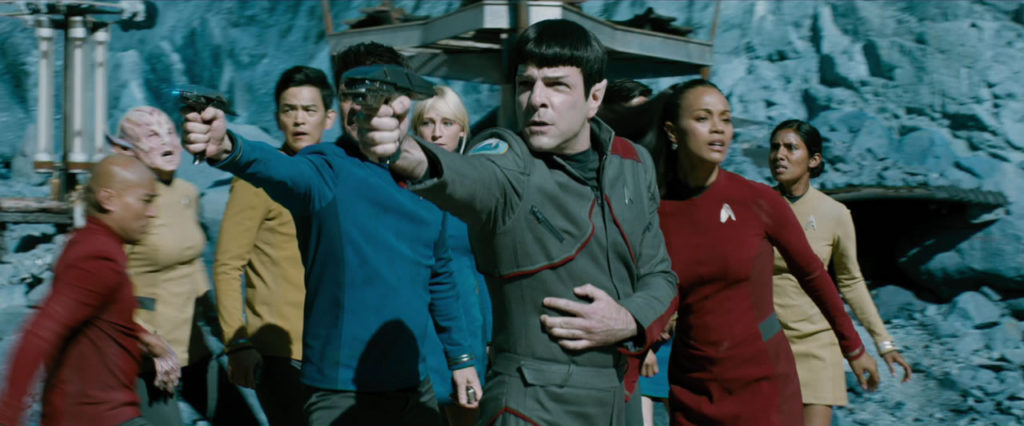
The film moves at a super-fast pace, Michael Giacchino’s score is uplifting and spirited– with a few cues from the original series thrown in– massively references Star Trek: Enterprise, of all things, and if one character beat had been included (you’ll know it when you see it, but it involves Krall at the climax right before he is dispatched), it would have bumped this movie up to a higher score.
I highly recommend this. A great cast finally getting character work, great action (again, the Enterprise being destroyed with a wild, wild scene); actual incorporation of the Beastie Boys “Sabotage” in a way that actually works to push the story forward; complete lack of any distracting romantic subplot; and, my favorite scene, an incredibly touching tribute to the original actors, as well as dedications to the late Leonard Nimoy and Anton Yelchin. This is, finally, proof that Star Trek can survive the current blockbuster climate. Hope to see it continue.

Star Trek Beyond is currently playing in movie theaters everywhere.

